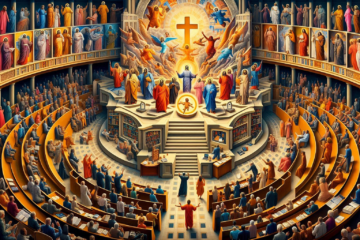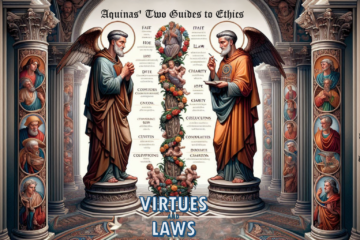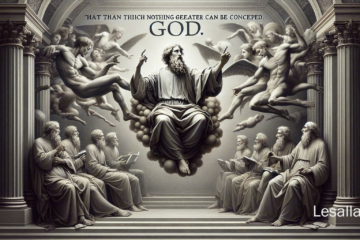Lesallan | April 27, 2025

The Perfect Being: Bridging Classical Philosophy and Daily Inspiration
In my recent journey of inquiry, sparked by enlightening discussions with the professor and another student, I have found that the concept of the Perfect Being has evolved from an abstract philosophical idea into a vibrant guiding presence that infuses my daily life with meaning.
Revisiting Classical Foundations
The professors’ insights reminded me that the greatest conceivable being must not reside merely as an idea. Drawing on Anselm of Canterbury’s classic argument (c. 1078), he emphasized that if this Perfect Being exists only in thought, it falls short of maximal greatness. Complementing this view, another student articulated how the approaches of Anselm and Aquinas converge on a single truth: a being whose existence is necessary and self-evident. Where Anselm relies on conceptual necessity, Aquinas anchors his reasoning in causal dependency (c. 1265–1274). This dialogue naturally opens the door to modern modal logic, especially the framework of possible-worlds semantics, as explored by Nash (1999). Such approaches challenge us to consider whether the interplay of necessity and contingency might further solidify these age-old arguments.
Merging Tradition with Modern Thought
Integrating modern analytical methods into these timeless debates honors the depth of classical philosophy and pushes our understanding forward. By examining necessity through the lens of modal logic, we enrich our perspective: a fully actualized, perfect being must transition beyond an abstract concept into the realm of existence. This synthesis invites us to re-evaluate the assumptions upon which our understanding of reality is built and to appreciate how logical rigor can harmonize with mystical insight.
A Personal Transformation
Beyond scholarly debates, embracing the idea of a Perfect Being has reshaped my inner landscape. No longer confined to philosophical musings, it has become a living, ever-present source of inspiration. Each morning, as the soft light of dawn fills my room, I sense the promise of new beginnings—a quiet reminder of a greater presence. A simple act of kindness can spark a heartfelt conversation with this divine force in the solitude of an evening walk, or even amid the bustle of daily life.
This connection is natural and profound. It is not about formal rituals but a continuous, mindful prayer that infuses every thought, every breath, and every moment. In both challenges and celebrations, I find that the Perfect Being weaves itself into the fabric of existence, encouraging a life lived with humility, gratitude, and purpose.
Looking Ahead: The Interplay of Necessity and Contingency
As we stand at the crossroads of classical thought and modern logic, I am eager to explore how emerging insights in modal logic might further illuminate the delicate balance between necessity and contingency. Reflecting on the biblical passage from John 1:13, which asserts the eternal, creative nature of the divine, I am reminded that our understanding of the Perfect Being is as much an act of intellectual inquiry as it is a source of spiritual solace. This rich interplay continues to shape my worldview, prompting questions that inspire deep reflection and ongoing exploration.
I invite you, too, to embrace this dialogue. Whether you ponder the metaphysical underpinnings of existence or seek a daily reminder of boundless love and infinite possibility, may these reflections guide you on your own journey toward a more expansive understanding of life.
Blessings,
Lesallan
References:
Anselm of Canterbury. (c. 1078). Proslogion. Retrieved from https://archive.org/details/st.anselmsproslogion
Aquinas, T. (c. 1265–1274). Summa theologiae. Retrieved from https://ccel.org/a/aquinas/summa/home.html
Nash, R. H. (1999). Life’s ultimate questions. Zondervan.



0 Comments